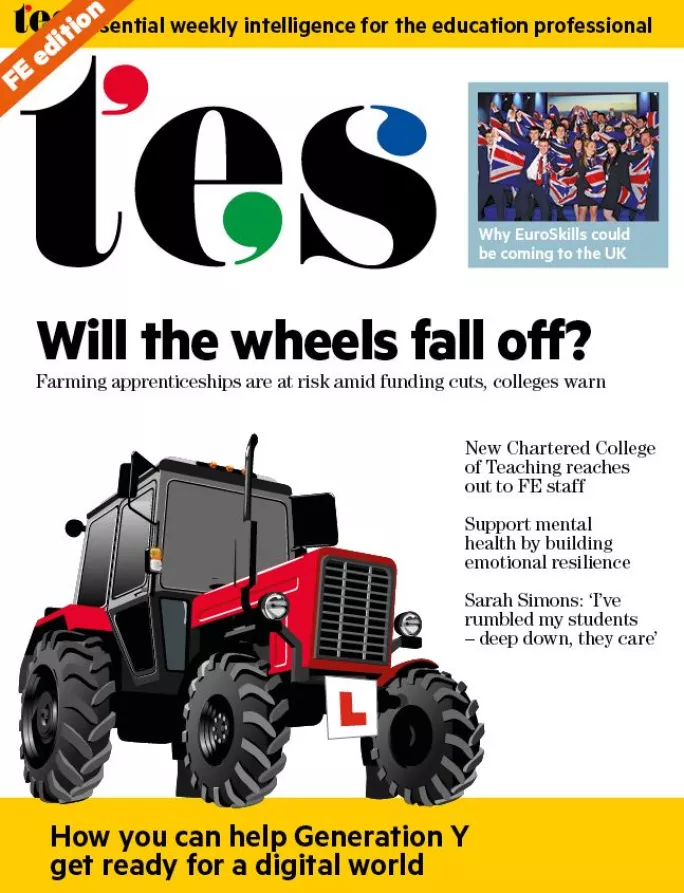- Home
- In this week’s TES Further: Could EuroSkills be coming to the UK?
In this week’s TES Further: Could EuroSkills be coming to the UK?

In this week’s TES Further, FErret reveals that there’s at least one UK city keen to be in the running to host EuroSkills 2022 (article free for subscribers) - after Budapest in 2018 and Graz in 2020, that is. Is it London? Or Manchester ? No, it’s Glasgow, with City of Glasgow College in the mix to host the showpiece event. City of Glasgow College’s bid is yet to be endorsed by WorldSkills UK, the body responsible for making any bids to host international skills competitions. A final decision on whether the UK will be submitting a bid to host the 2022 competition - some 11 years after the landmark London 2011 WorldSkills contest - is expected in the coming weeks.
Future farmers
TES reporter Julia Belgutay reveals that swathes of agricultural apprenticeships could be scrapped because funding changes threaten to make them financially unviable. Landex, the umbrella body for land-based colleges, has told TES that even with the transitional protection for 16-18 apprentices that was announced in October, funding for agricultural apprenticeships will drop by as much as a 25 per cent in May.
Apprentices in trouble
Meanwhile, shadow chancellor John McDonnell has raised fears that apprentices from the most deprived backgrounds are being denied thousands of pounds of financial support available for college and university students. “We all support the concept of apprenticeships,” Mr McDonnell told TES. “I meet with employers, I meet with providers; everyone’s into the concept of apprenticeships. But they’ve got to be, first of all, quality apprenticeships, and people have got to be supported and sustained while doing apprenticeships.”
Keen for FE
TES columnist Sarah Simons writes about the Chartered College of Teaching - a new organisation for people who work across the entire teaching profession (article free for subscribers). The governing body, which claims to be comprised of “volunteers from across the education community and business”, currently has no FE representation. But in an interview with the body’s new chief executive, Dame Alison Peacock, Sarah reveals that the organisation is “keen to understand more about FE”. “Schools need to hear more about some of the work that goes on in FE and similarly, FE colleagues want to hear from schools,” Dame Alison said.
Later in the magazine, Sarah writes that just witnessing students turning up for an exam - after they have previously caused problems in the classroom - is a moment when every teacher can see that their class really do care about their studies (article free for subscribers). “With them compliant in silence, the sharp edges were shaved off and it allowed me to glimpse each of their vulnerabilities,” she writes. Despite the fact that some had shown apathy in the classroom, Sarah realised that, with them sitting in line in the exam hall in silence, getting on with their work, “they showed that they care, too”.
Three pillars of mental health
Sally Dicketts, chief executive of Activate Learning, writes that her organisation instils a philosophy that recognises the importance of mental health (article free for subscribers). It highlights three areas of importance, or “pillars of learning”, which can help hold up mental health. First, the importance of teaching students about how their brain functions; second, helping them to understand the brain’s potential in order to boost self-esteem and motivation; and third, the ability for students to understand and analyse their emotions. “If we feel insecure then we immediately sabotage our ability to learn,” she writes.
Generation Y
Stuart Rimmer, principal and chief executive of Great Yarmouth College, says that colleges must adapt to Generation Y, or “neo-digital natives”, as he calls them (article free for subscribers). “There is no doubt that the next generation are hugely different in their social and technological interactions,” Rimmer writes, “and to think otherwise could be foolish and counterproductive.” He says that colleges, as educational institutions, should ask two critical questions: one, how pedagogical approaches, engagement and support need to respond to this new wave of students; and two, how employers need to lead the way in supporting the employees of tomorrow.
All this and much, much more in this week’s TES Further.

Want to keep up with the latest education news and opinion? Follow TES FE News on Twitter, like us on Facebook and follow us on LinkedIn
Keep reading for just £1 per month
You've reached your limit of free articles this month. Subscribe for £1 per month for three months and get:
- Unlimited access to all Tes magazine content
- Exclusive subscriber-only stories
- Award-winning email newsletters



